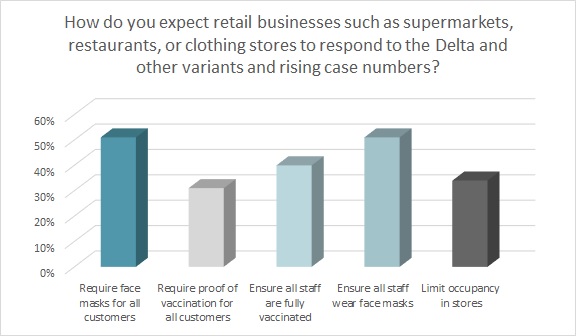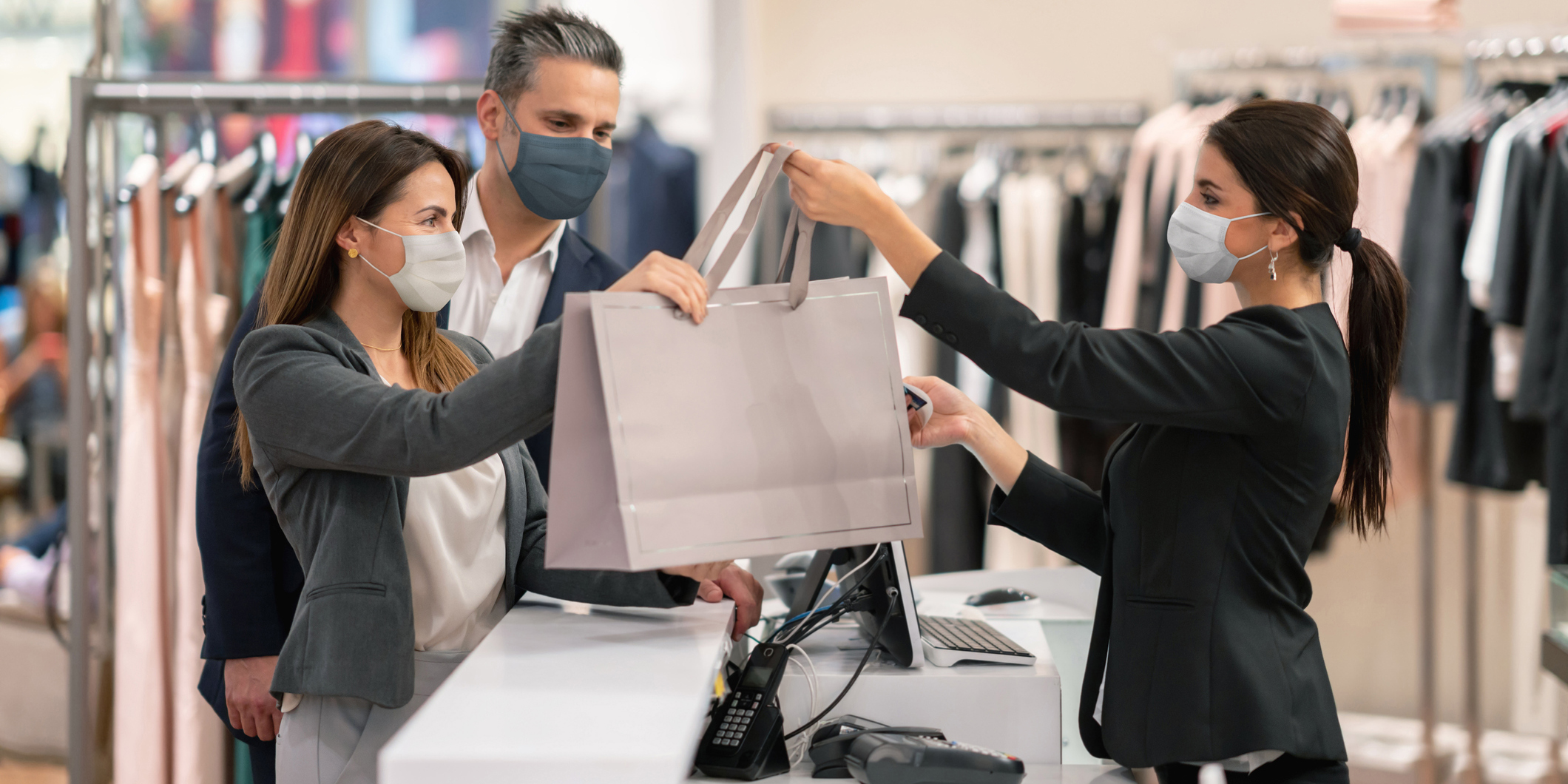Stores regularly talk about the importance of the customer experience. But the pandemic and the ensuing employee attrition has more retailers discussing the significance of listening to frontline associates’ concerns while meeting customer demands. This has become especially pressing as the Delta variant continues to surge across the U.S., jangling the nerves of shoppers and the workers who assist them.[quote]
A recent Shopkick survey found 30 percent of consumers are more worried about COVID as Delta cases continue to rise. Additionally, 40 percent feel the same level of discomfort they did one month ago. Among the concerned shoppers, 43 percent say Delta is impacting how they shop and 47 percent are worried about shopping in-store.
Unlike the early days of the pandemic — when most Americans were stuck at home, many of them perfecting their online shopping habits — consumers are now challenging retailers to offer the perfect combination of product, service, and experiences, whether online or in-store. Yes, it may have been a grueling year-and-a-half for merchants, but most shoppers are still demanding. In fact, 66 percent wish apparel brands and retailers knew more about what they like and how they shop, according to the2019 Cotton Incorporated Lifestyle Monitor™ Survey. Among younger shoppers, those aged 13-to-34, the number significantly increases to 74 percent.
Consumers would like this personalization to happen despite there being more foot traffic than last year and, quite often, fewer store associates at physical locations. In July, Zenreach found nationwide retail foot traffic was up 52 percent since the start of 2021 across all industries. But Megan Wintersteen, Zenreach’s vice president of marketing, said recent data showed customer foot traffic to physical stores and restaurants flattened over July, something the company considered a reflection of the growing concern over Covid’s Delta variant.
At the same time, the number of people leaving retail jobs climbed. In June, stores saw exits increase 5.5 percent to 847,000, according to the U.S. Bureau of Labor Statistics (BLS). That’s up from 768,000 in May and a sizable increase over June 2020, when departures were 627,000. It’s not all bad news, though: hires increased 7.3 percent, with retailers adding 1.1 million jobs in June.
Of course, retail has always been tough but this high turnover rate reflects how extraordinary these pandemic times have been for stores and their employees. As RSR Research’s Brian Kilcourse and Steve Rowen, managing partners, point out in a recent benchmark report on contactless shopping, retailers have been jumping through hoops to accommodate customers.
“Safe alternatives to more ‘traditional’ BOPIS haven’t been free,” reads their report, “What Contactless Shopping Means for the Store.” Rather, RSR finds, “They have often come at a great cost to overall margin. Getting employees to act as warehouse pickers and vehicle loaders, while still being helpful, customer-facing problem solvers as well as cashiers, adds expense.”
Still, Kilcourse says, after a year-and-a-half of dealing with COVID, merchants realize some of these changes are here to stay and are planning to adjust.
“Almost 80 percent of general merchandisers accept that curbside pickup of online orders has become a baseline service offering,” Kilcourse says. “Late or not, retailers have gotten religion when it comes to the new capabilities required to service customers in new ways.”
Most consumers (71 percent) have admitted the pandemic will change the way they shop in the future, according to Cotton Incorporated’s Coronavirus Response Consumer Survey (Wave 7, Aug. 6, 2021). With Delta variant cases rising, consumers plan to wear a face mask more often when in public (52 percent), social distancing with most people (49 percent), and shopping online to avoid potential exposure (40 percent).
Despite these hitches, 77 percent of consumers expect to spend more (44 percent) or the same (33 percent) as they have in the past on apparel this year, according to the Coronavirus Response Survey (Wave 7).
Already, most (66 percent) have been buying at least half or more of their clothes from a physical store, according to the Coronavirus Response Survey (Wave 7). And 73 percent look forward to shopping for clothing in-store when the pandemic is over… whenever that might be.
To carry out this planned in-store shopping, consumers have expectations for retailers: More than half (51 percent) want stores to require face masks for all customers, according to the Coronavirus Response Survey (Wave 7). They also expect stores to ensure all staff wear masks (51 percent), ensure all staff are fully vaccinated (40 percent), offer online ordering with curbside or in-store pickup (40 percent), limit store occupancy (34 percent), space clothing racks and display tables apart to allow for social distancing (33 percent), and require proof of vaccination for all customers (31 percent).

Retailers are faced with threading the needle of meeting consumer expectations while training and retaining frontline workers. And those associates are key to physical retail’s success, according to PSFK’s Scott Lachut, partner and president of research and strategy. He explained during his firm’s virtual Retail Innovation Week webinar, “Omnichannel Journeys,” that the human touch is important when it comes delivering an “amazing” customer experience.
“A lot of this is also driven by technology that actually makes those connections,” Lachut said. “We look at things like on-demand chat, specifically in the context of a shopper in-aisle. They can get in touch with either an associate and call them over for a one-to-one interaction, or perhaps connect with a brand expert to have questions answered about particular products. And we really love what we’re calling cross-channel clienteling. This is where an associate is selling both to a consumer through video and chat, as well as understanding the customer in a face-to-face context, and using all that information to drive a more personalized experience.”
Intermix’s Ron Thurston, author of “Retail Pride” and vice president of stores, said during PSFK’s webinar that it’s not always technology that helps an employee do their job better: If retail management is just as attentive to the growth and development of frontline associates, it will both improve retention and grow business.
“Everyone that works on frontline teams wonders if this is the work they want to commit to doing,” Thurston said. “That commitment happens when brands say, ‘I would love to provide great growth and training opportunities, financial incentives and maybe product incentives to be able to retain top talent.’ I think sometimes human engagement is the most motivating one.”
